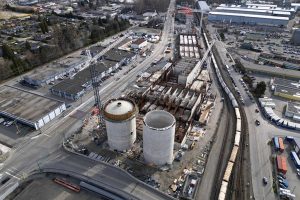The Calgary Construction Association (CCA) believes the city’s massive Green Line LRT project could be in danger of going off the rails, but officials have yet to address their concerns.
One of the main issues the CCA has raised concerns about is the disproportionate involvement and influence of foreign consortiums and the absence of Calgary or Alberta-based builders in the project.
The Green Line Board recently approved Bow Transit Connectors (Barnard Constructors of Canada, LP, Flatiron Constructors Canada Ltd, and WSP Canada Inc) and City Link Partners (Aecon Infrastructure Management Inc, Dragados Canada Inc, Acciona Infrastructure Canada Inc, Parsons Inc, and AECOM Canada Ltd) to advance to the Request for Proposal stage for Phase 1 of the project. This involves building out the 18 kilometre core of the Green Line, its most technically complex section.
Bill Black, president of the CCA, fears local subcontractors and suppliers could get burned on the project and many of the economic benefits of the work could go overseas.
“While the scope of the Phase 1 contract has led to involvement of multi-national companies, most, if not all of the actual work on the project, will be performed by local and domestic trades,” said Holly Gibney, senior manager of public relations and partnerships for the Green Line. “As we advance through the procurement process, Green Line will engage and connect with industry to facilitate their involvement.”
Gibney added all early works opportunities are advertised through Merx Calgary and Alberta Purchasing Connection. She noted Green Line officials are also committed to sharing information with stakeholders, including the CCA, in advance of opportunities being posted.
“The city keeps deflecting to the fact that local suppliers and contractors will be working on the project, but that was always the case,” said Black.
He added foreign consortiums do have a record of bringing in significant volumes of individuals from their own hometowns and from their own relationships, like engineers and specialists.
“Our main concern is who the key proponents are because that’s where the real money is and where it leaves our economy and where real priorities are driven from,” he said. “Foreign consortiums don’t have allegiances to local concerns which puts can put the treatment of small contractors and suppliers at risk. That’s been completely ignored, and they say we can bid as if that’s some appeasement. If anything, we are concerned that some of our member firms get involved in this and live to regret it.”
Black explained unlike foreign entities, local companies are incentivized to behave well because their future business in the region depends on it.
“It’s an unreasonable risk that we could be left with unpaid bills from foreign entities that have skipped town,” said Black. “You don’t have to be much of a conspiracy theorist to be concerned about what could happen.”
Acciona, which is part of one of the shortlisted proponent teams, recently caused controversy last year in Metro Vancouver, where officials say it walked away from a critical $1 billion wastewater treatment project.
“On Sept. 29, without notice, Metro Vancouver learned that the contractor of the North Shore Wastewater Treatment Plant Project, Acciona Wastewater Solutions LP, significantly reduced staff working on the project,” said a Metro Vancouver spokesperson. “It appears to Metro Vancouver that Acciona has abandoned the project.”
This came after the contract was revised in 2019 to give Acciona two-and-a-half extra years to complete the project.
“We stand by our concerns that this project could go seriously astray, financially or otherwise, and when that happens, just about anybody that gets involved gets dragged down,” said Black. “The smaller you are, the less likely you can protect yourself. Every time we have brought up that concern we have been dismissed. And it concerns you even more when the few people with the ability to make a difference seem to refuse to accept that there is a problem.”
At $5.5 billion, the Green Line is the largest investment in Calgary history. The CCA has also long argued the price tag for the project will rise significantly because it has been mired by numerous delays, cancelled procurements and missed construction windows and, as a result, failed to capitalize on a better cost climate.










Recent Comments
comments for this post are closed